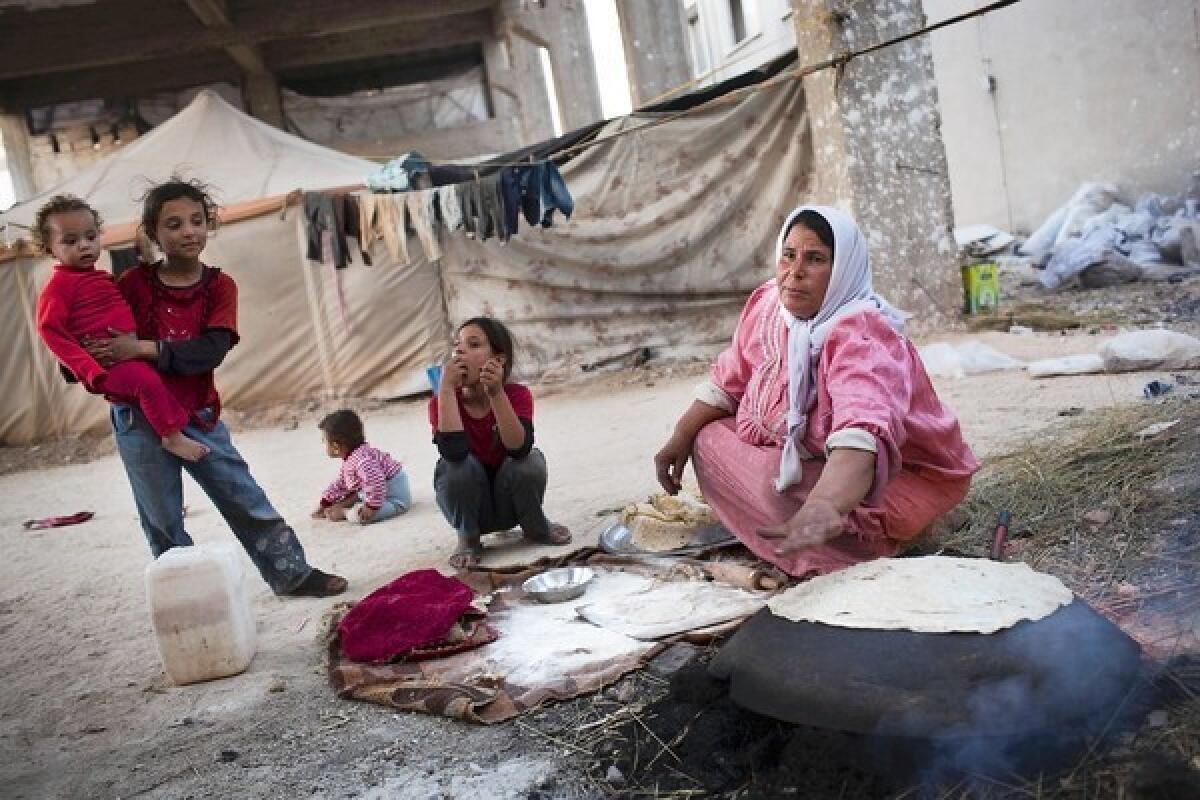In Syria, a new order for daily bread

ALEPPO, Syria — The bags of pita bread are stacked in tight formation on the sidewalk, as if standing at attention.
From here they will be dispersed across the rebel-held neighborhood to small, nondescript distribution centers: the bike repair shop down the street, the corner convenience store or the electrician’s shop. The long lines that used to form outside bakeries, tempting targets for government air attacks, are gone.
“We created the center for the protection of the people,” said Abu Muhammad, a member of the bakery committee for the Bustan Qasir and Kalaseh neighborhoods.
The war in Syria has disrupted food supplies, and few scarce commodities are missed more than bread, a staple in the nation. At the height of the shortages last year, Syrians posted sonnets online about a boy and his beloved: a loaf of bread.
Shortages in opposition neighborhoods and towns lead to long lines and crowding at the few functioning bakeries, which become targets for government shelling or airstrikes in which dozens have been killed. Now bakeries here in Aleppo no longer sell directly to customers.
“The whole point was to avoid the crowding,” said Yusuf Hirih, owner of an eponymous bakery in Kalaseh neighborhood. “When people come to buy we point them to the center, if we sell to one we have to sell to all.”
Outside the Hirih bakery stands a fighter from Al Qaeda-affiliated Al Nusra Front to help enforce the rule. It was a member of Al Nusra Front who first suggested decentralized bread distribution, and the concept has spread across the city.
The men working at Hirih’s move quickly through their intersecting tasks as if tightly choreographed, rolling the dough, flipping it and, after baking, tossing it over to be wrapped. Outside a truck pulls up, and two men walk past the rows of bread on the sidewalk — destined for 15 centers — carrying large bags of flour inside.
For much of 2012, severe flour shortages forced residents to line up outside bakeries for hours, making them sitting ducks. Often, multiple city districts were served by the sole bakery left functioning.
Since the Syrian uprising began in early 2011, one opposition rights group has documented more than 34 bakery attacks that have left more than 300 dead. In December, at least 90 civilians were reported killed in an airstrike on a bakery in Hama province a few days after the area was seized by rebels.
Opposition leaders and human rights activists have accused the government of engaging in collective punishment by targeting civilian gathering places to disrupt life.
“The regime wants life to stop,” a rebel said after one such attack.
Bakery owners tell of instances when the flour ran out or the power was cut, forcing customers to leave, followed minutes later by a shell striking the bakery but causing no loss of life.
“God saved the people,” Hirih said, recounting his own experience with a near-miss.
The bread distribution centers have tried to reduce both the hits and misses.
***
On a narrow side street with uneven sidewalks, two children help Ahmad Muhammad Malas fix a black and blue bike. Inside Malas’ small bike repair shop, the walls are almost entirely covered with dirty spare parts.
Every other day, the storefront is transformed when loaves of bread are delivered and he lays them out along the two sofas inside.
“Two other streets down there is another center and two streets down from there another one,” he said. “They have become like samaans,” or neighborhood convenience stores.
Malas takes out a ledger in which he has recorded all of his customers, the number of people in the family, how many loaves they are allowed to buy and on what days. For every four or five members, a family is allowed to buy one loaf of bread every other day.
Each family is given a bread punch card issued by a local humanitarian group, which is checked off with each purchase.
In a city ruled by the chaos of war, bread has come under a strict system of order.
“Thank God the situation has really improved,” Malas said.
Elsewhere in Syria, the same high level of risk continues. On Oct. 11, in a town just south of Aleppo, the site of fierce fighting between rebels and government forces, 25 people were killed and more than 50 injured when bombs were dropped on the center of town, home to what was then the community’s sole functioning bakery.
An activist from the town of Safira estimated that about 150 civilians were at or near the bakery because all other bakeries had shut down due to a lack of flour.
***
On a warm night in late summer, a bakery oven was operating in Aleppo, churning out bread.
Out front, young men grabbed several loaves at once and threw them into the back of a truck. Once full, the truck drove less than 25 feet to a distribution center to be unloaded and then reversed back to the bakery, as if a trolley at an amusement park.
On this night, men and boys swarmed the center on a dark side street grabbing at loaves of fresh bread courtesy of the provincial council.
The lure of free, warm bread in this city was too much to pass up, even with the risk of being in a crowd. The importance of bread fresh out of the oven is such that Syrians even have a saying about people with sour dispositions: He doesn’t smile, not even for hot bread.
It took months for the distribution centers to catch on precisely for that reason.
“To be honest, people found it hard to accept; they are accustomed to getting fresh bread,” said resident Muhammad Omari.
Beside him, a man in a navy blue Who T-shirt who was holding his family’s bread punch card nodded.
“When the bread is fresh, it’s better than when it’s cold and stale,” said Abdulmueen Ijla as he was handed his loaf. “These today are good.”
More to Read
Start your day right
Sign up for Essential California for news, features and recommendations from the L.A. Times and beyond in your inbox six days a week.
You may occasionally receive promotional content from the Los Angeles Times.







